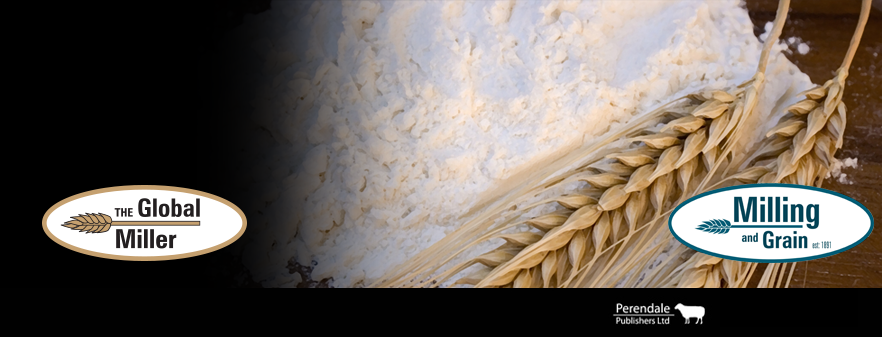by
Mildred Cookson, The Mills Archive, UK
This well-established British Engineering Works featured in ‘The Miller’ of November 2, 1885
Continuing their series of visits to the firms principally involved in the manufacture of flour milling machinery, they reported on the ironworks at Wickham Market.
The site benefitted from its closeness to the then Great Eastern Railway, with a telegraph office close by. It was also then, among the oldest established engineering and millwrighting workshops of England.
The Wickham Market Ironworks were already more than 100 years old, having been founded in 1780 by the Grandfather of the senior partner running the firm in 1885, William Whitmore.
William, after serving an apprenticeship in mechanical engineering with a firm in Lincolnshire, was taken into partnership by his father. At that time the firm had started to manufacture steam engines and boilers and had installed them in the Chelmsford and Barking steam mill of Messrs Ridley as well as in the Isle of Thanet steam flourmills.
In 1862, Mr John Whitmore senior retired and William succeeded him along with
John Whitmore Junior. Mr George Binyon became a member of the firm around 1868,
and after working in Wickham Market for ten years, took up offices at 28 Mark
Lane, London.
This proved a good move as it placed the firm at the centre of the milling trade, enabling them to deal with foreign expansion of the firm, in which they supplied their stone mills, bolting chests and other machinery in which they specialised.
In January 1871, the company was approached by Mr Seth Taylor to fit up his flourmill at Waterloo Bridge, which would require 30 pairs of stones. In 1874 Mr Peter Mumford of Vauxhall flourmill made a similar request involving 24 pairs of stones.
In 1890 Mr Taylor again requested the firm to fit out St Saviour’s Mills at Dockhead with 20 pairs of stones. All these mills were also fitted out with their patent belt-driven hursts.
Many other mills would also be filled with Whitmore & Binyon machinery, for example: Messrs Marriage at Chelmsford, Messrs Press Brother’s; City Flour Mills Lincoln, Town Mills Melksham Wiltshire and Mr Jonathan Mess’s mills in Aberdeen.
On the night of December 20, 1880, a fire broke out in a shed at the back of the works. This caused £2000 (US$2491) worth of damage and the loss of several sheds and workshops.
The fire raged on for six hours, and the whole premises would have been destroyed but for an inexhaustible water supply from an artesian well on the spot.
Work continued thanks to the fact that local firms offered help and their workshops to Mr Whitmore to keep his business going.
Read the full article HERE.
This well-established British Engineering Works featured in ‘The Miller’ of November 2, 1885
 |
| Mildred Cookson |
Continuing their series of visits to the firms principally involved in the manufacture of flour milling machinery, they reported on the ironworks at Wickham Market.
The site benefitted from its closeness to the then Great Eastern Railway, with a telegraph office close by. It was also then, among the oldest established engineering and millwrighting workshops of England.
The Wickham Market Ironworks were already more than 100 years old, having been founded in 1780 by the Grandfather of the senior partner running the firm in 1885, William Whitmore.
William, after serving an apprenticeship in mechanical engineering with a firm in Lincolnshire, was taken into partnership by his father. At that time the firm had started to manufacture steam engines and boilers and had installed them in the Chelmsford and Barking steam mill of Messrs Ridley as well as in the Isle of Thanet steam flourmills.
 |
| Mr WN Whitmore |
This proved a good move as it placed the firm at the centre of the milling trade, enabling them to deal with foreign expansion of the firm, in which they supplied their stone mills, bolting chests and other machinery in which they specialised.
In January 1871, the company was approached by Mr Seth Taylor to fit up his flourmill at Waterloo Bridge, which would require 30 pairs of stones. In 1874 Mr Peter Mumford of Vauxhall flourmill made a similar request involving 24 pairs of stones.
In 1890 Mr Taylor again requested the firm to fit out St Saviour’s Mills at Dockhead with 20 pairs of stones. All these mills were also fitted out with their patent belt-driven hursts.
Many other mills would also be filled with Whitmore & Binyon machinery, for example: Messrs Marriage at Chelmsford, Messrs Press Brother’s; City Flour Mills Lincoln, Town Mills Melksham Wiltshire and Mr Jonathan Mess’s mills in Aberdeen.
On the night of December 20, 1880, a fire broke out in a shed at the back of the works. This caused £2000 (US$2491) worth of damage and the loss of several sheds and workshops.
The fire raged on for six hours, and the whole premises would have been destroyed but for an inexhaustible water supply from an artesian well on the spot.
Work continued thanks to the fact that local firms offered help and their workshops to Mr Whitmore to keep his business going.
Read the full article HERE.
The Global Miller
This blog is maintained by The Global Miller staff and is supported by the magazine Milling and Grain
which is published by Perendale Publishers Limited.
For additional daily news from milling around the world: global-milling.com


No comments:
Post a Comment